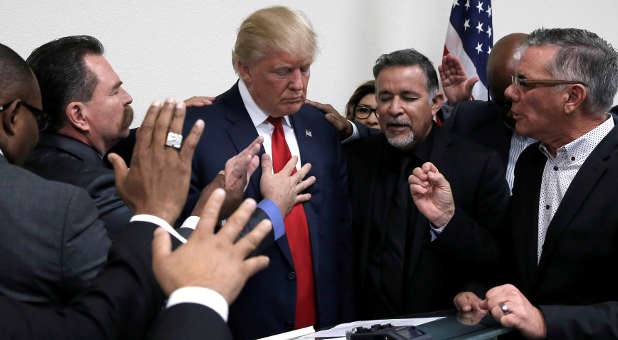
In a surprise to many, Donald J. Trump was elected in an electoral landslide. Although many reasons have been given to explain the phenomena, economics was a major factor.
Manufacturing jobs are down about 30 percent since the turn of the century. Middle-class wealth has been falling since the mid-1980s. The lowest 80 percent of households have seen flat incomes since the late 1970s.
The distribution of incomes is becoming even more skewed toward the more well-off, while the middle-class is disappearing. Gross domestic product (GDP) per capita has been trending down for the last decade. Spiraling health care and housing rental costs are squeezing millions. Members of the middle class have seen their standard of living fall, and many have lost economic hope. But many remember better economic times. The slogan "Make America Great Again" resonated.
The night of the election, futures of the Dow Jones Industrial index fell 800 points as traders reacted to uncertainty. The next day, calmer heads prevailed, and the market set a new all-time high. The rally continued, and the Dow closed the week at a historic high. Bonds, currencies and commodities fell. The markets appear to have confidence in Mr. Trump's proposed policies.
If enacted, Mr. Trump's plan of lower corporate taxes and a reduced regulatory burden should increase business profits and stimulate business. A better business environment should promote employment. Lower personal taxes and lower health costs (if they materialize) should increase disposable income for all consumers and further stimulate business.
International trade is an uncertainty, but some of Mr. Trump's comments are worrisome. Spending will also have to be better managed than in the past. Overall, expect output, investment and employment to grow. Inflation and interest rates will inch higher.
Mr. Trump's candidacy was widely supported by evangelicals and Catholics. Few elections have had as many people on both sides who were so emotionally invested. Demonstrations by Secretary Clinton's supporters are common today. The Democratic party is widely split. The Republican party was divided during the campaign and still has many wounds. Hispanic and other immigrants are anxious.
However, Mr. Trump's election should be good for the church and the kingdom. Old threats should be reduced. New opportunities should become apparent. If campaign promises materialize, kingdom impacts include:
Greater religious freedom.During the campaign, Mr. Trump indicated there would be greater respect for conscience. Churches, ministries and individual Christians should have more protection against being forced to do something which opposes their beliefs and biblical mandates. Many churches and other Christian organizations were on a collision course regarding abortion funding, LGBT issues, gender identity and other items. Greater religious freedom would help to alleviate some of these concerns of conscience.
Greater opportunity to model and demonstrate Christ's love. Many in our nation are anxious, fearful and depressed. The church can and should be an instrument for healing. We have greater opportunity to demonstrate His unfailing love as we reach out to the hurting in word and action.
Greater political freedom. Mr. Trump has vowed to repeal the Johnson amendment. This 1954 change to the IRS code prohibits churches and other nonprofits from engaging in direct or indirect support of any political campaign. Churches and nonprofits who violate the prohibition are threatened with loss of 501(c)(3) status. Repeal would increase the ability of churches to support candidates and causes they believe have greater alignment with kingdom principles.
A court more predisposed to issues important to Christians. Because of the age of some of the Supreme Court justices, President Trump is expected to appoint a significant number of justices who will be more conservative constitutionalists. Although it often takes many years to feel the full impact of new justices, a few key decisions could quickly change the legal environment of the church.
No president or political party can change hearts. Many of the social ills of the 21st century are the result of failures of the American church. Perhaps these new opportunities will allow the church to lay a surer foundation by changing hearts. ![]()
Dr. James Russell is a professor of economics and undergraduate chair of the College of Business at Oral Roberts University.
Get Spirit-filled content delivered right to your inbox! Click here to subscribe to our newsletter.
Dr. Steve Greene is now sharing stories, teachings, and conversations with guests who lead with love on Love Leads, a new podcast. Listen now.
Dr. Mark Rutland's
National Institute of Christian Leadership (NICL)
The NICL is one of the top leadership training programs in the U.S. taught by Dr. Mark Rutland. If you're the type of leader that likes to have total control over every aspect of your ministry and your future success, the NICL is right for you!
FREE NICL MINI-COURSE - Enroll for 3-hours of training from Dr. Rutland's full leadership course. Experience the NICL and decide if this training is right for you and your team.
Do you feel stuck? Do you feel like you’re not growing? Do you need help from an expert in leadership? There is no other leadership training like the NICL. Gain the leadership skills and confidence you need to lead your church, business or ministry. Get ready to accomplish all of your God-given dreams. CLICK HERE for NICL training dates and details.The NICL Online is an option for any leader with time or schedule constraints. It's also for leaders who want to expedite their training to receive advanced standing for Master Level credit hours. Work through Dr. Rutland's full training from the comfort of your home or ministry at your pace. Learn more about NICL Online. Learn more about NICL Online.


